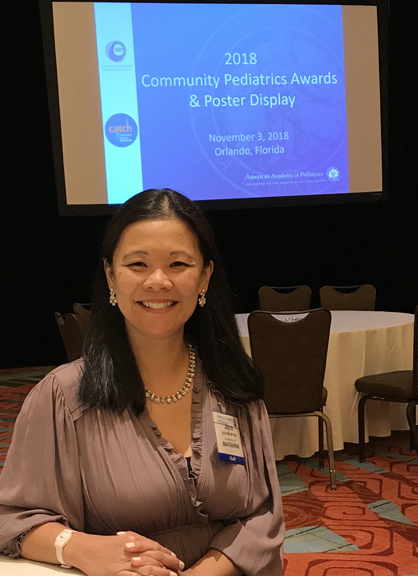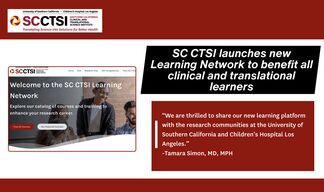Boosting Minority Participation in Health Research by Listening to the Community
In a study involving Filipino Americans in Los Angeles, CHLA/Keck physician-researcher Joyce R. Javier, MD, and her team used a popular minority recruitment model to refine their message for that population.
Health scientists regularly employ familiar recruitment models to boost minority representation in clinical and translational research. But even when using a model designed to address minority communities, successful recruitment requires good listening as much as good science, and researchers may find their long-held assumptions about groups to be incorrect, explained Joyce R. Javier, MD, assistant professor of clinical pediatrics at Keck School of Medicine and attending physician at Children's Hospital Los Angeles.

Javier, who specializes in behavioral health among Filipino youth and families in the United States, recently published a paper examining the performance of the Matching Model of Recruitment in minority populations, a widely used conceptual framework for recruiting ethnic minority groups into research studies. Through the pilot, Javier's team drew new lessons for use of the Matching Model of Recruitment in the Filipino community in the Los Angeles area.
The study is part of a continuum of research Javier has been conducting to address behavioral health disparities among Filipino youths and families, who experience higher rates of such health concerns compared to other ethnic subgroups in the United States, as well as non-Hispanic whites. These concerns include depression, suicidal behavior, and substance abuse. Yet Filipinos are less likely to participate in health research to address these behavioral and other serious health concerns.
The Matching Model of Recruitment offers a framework of social context and interaction between researchers and the communities they work with. It is designed to help researchers identify the aspects of their presentations to the target communities that may be hindering research participation, and to help develop more successful messages and approaches. Javier's research team applied the Matching Model when recruiting Filipino families into a randomized controlled trial aimed at evaluating a video to promote enrollment in parenting programs.
For example, one of the cultural concerns among Filipinos that Javier was aware of—from lifelong personal and professional experience—was a strong sensitivity to matters of behavioral and mental health, and a reluctance to discuss such issues, much less seek care for them. So her research team crafted a call for participation that addressed the dangers of these issues in what they thought was an appropriately general manner, initially avoiding mention of the statistics regarding behavioral health problems among Filipino youth.
But after meeting with Filipino parents who reviewed the initial call for participation, the research team got clear feedback: don't hold back, give us the unvarnished truth about the real toll that behavioral health problems are taking on our community's kids and families.
"We look to parents as experts in how to outreach to other parents," said Javier. "It was parents who told us to include the real statistics about suicide among young people in our community."
There is no one-size-fits-all approach to minority recruitment for research studies, said Javier. Among Filipinos, for example, the researchers' affiliation with USC and CHLA helped build trust, while in other communities affiliation with large health institutions can create distrust.
"The key point is, when we designed our recruitment strategy, it wasn't just researchers or academics who were determining what's going to work in this particular community," said Javier. "It was people from that community explaining how they perceived our presentation." Their study recruited 215 participants out of an eligible 370—a good rate of success.
Javier and her research colleagues published their study, Recruiting Filipino Immigrants in a Randomized Controlled Trial Promoting Enrollment in an Evidence-Based Parenting Intervention, in the Journal of Immigrant and Minority Health. Coauthors include Angela Reyes, Dean M. Coffey, Sheree M. Schrager, Allan Samson, Lawrence Palinkas, Michele D. Kipke, and Jeanne Miranda.
Increasing the recruitment of minorities for health research is a central goal for the Southern California Clinical and Translational Science Institute, including through its Community Engagement core. The SC CTSI helped fund Javier's pilot study, provided digital recruitment support to help her achieve her accrual target, and has provided financial and professional assistance for several of Javier's Filipino-focused research projects. Javier is also an alum of the SC CTSI's mentored career development training program in clinical and translational science.



